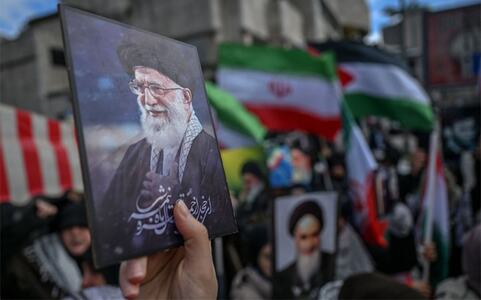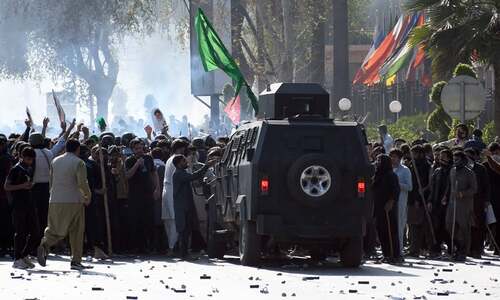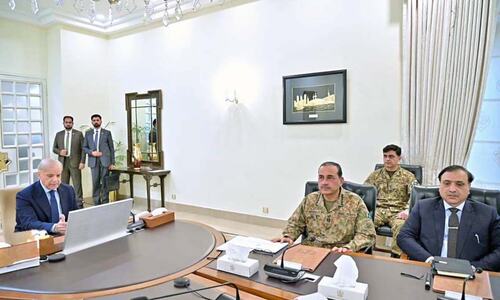• Accorded state funeral at Faisal Mosque
• Govt announces day of mourning
ISLAMABAD: Architect of Pakistan’s nuclear programme Dr Abdul Qadeer Khan passed away here on Sunday morning. He was accorded state funeral at Faisal Mosque before his burial at H-8 graveyard. He was 85.
Dr Khan was suffering from multiple ailments but his health deteriorated after he contracted coronavirus that doctors believed was cause of his death.
Flags were flown at half-mast on Sunday as the government declared one-day mourning on his demise that plunged the nation into grief. In many cities, funeral prayers were offered for him in absentia.
At Faisal Mosque, people in large numbers attended the state funeral. However, except Sindh Chief Minister Murad Ali Shah, no other chief minister or governor of any province was seen in attendance though some federal cabinet members did turn up. Interior Minister Sheikh Rashid Ahmed who along with Information Minister Fawad Chaudhry, Aviation Minister Sarwar Khan, Minister for Religious Affairs Noorul Haq Qadri, Revenue Minister Hammad Azhar and PM’s aide Shehbaz Gill, attended the funeral prayers led by Prof Ahmed Al Ghazali told the media that the premier had directed cabinet ministers to attend the funeral.
President Dr Arif Alvi, Prime Minister Imran Khan, federal ministers, opposition leaders and military leadership in their separate messages expressed condolence on the demise and praised contribution of the nuclear scientist to make the country an atomic power.
A doctor of Khan Research Laboratories (KRL) Hospital, where the ailing scientist was brought early morning, told Dawn that he was brought to the hospital at about 6 am and was declared dead an hour later. He believed Dr Khan might have died while being shifted to the hospital. “In fact he was suffering from multiple health problems and during his Covid-19 ailment his lungs were badly damaged which was believed to be the cause of his death,” the doctor said on condition of anonymity.
People came in large numbers and gathered outside the hospital in Sector G-9 to see their beloved scientist shortly after the news about his deteriorating health condition broke despite the rainy weather in Islamabad.
According to hospital sources, Dr Khan was given “Ghusal” (last bath) at the hospital and his body was moved to his residence in Sector E-7 from where it was taken to Faisal Mosque for funeral.
Before his burial, a controversy generated when Interior Minister Sheikh Rashid told a presser that Dr Khan’s family was “indecisive” whether he would be buried in the lawns of Faisal Mosque or at H-8 graveyard. A letter, apparently written by Dr Khan to Capital Development Authority (CDA) chairman with the request for his burial at H-8 graveyard after his death, went viral on social media in the meantime.
After the state funeral, the body was finally taken to H-8 graveyard where he was laid to rest.
President Arif Alvi tweeted: “Deeply saddened to learn about the passing of Dr Abdul Qadeer Khan. Had known him personally since 1982. He helped us develop nation-saving nuclear deterrence, and a grateful nation will never forget his services in this regard. May Allah bless him.”
In a separate tweet, Prime Minister Imran Khan condoling his death wrote: “Deeply saddened by the passing of Dr A.Q. Khan. He was loved by our nation because of his critical contribution in making us a nuclear weapon state. This has provided us security against an aggressive much larger nuclear neighbour.
“For the people of Pakistan he was a national icon.”
Opposition Leader in the National Assembly Shehbaz Sharif said: “His death marked the proud history of making Pakistan’s defence insurmountable and the Pakistani nation would forever remain in their debt for dedicating his entire life to fortify the country’s defence.” He also announced that his party would observe a day of mourning on Sept 11.
The interior minister earlier said Dr Khan was given state funeral on PM’s direction. The premier directed cabinet ministers to attend the funeral, he said, adding that the chairman of the Joint Chiefs of Staff Committee and the services chiefs would also be in attendance.
Mr Rashid said two graves — one at Faisal Mosque and another at the H-8 graveyard — were prepared but his family later decided that as per his last will he would be buried at the H-8 graveyard.
Last month, Dr Khan had complained that neither PM Khan nor any of his cabinet members inquired after his health while he was under treatment at hospital. He was admitted to KRL Hospital on August 26 after he tested positive for Covid-19. He was later shifted to a military hospital in Rawalpindi and was discharged after he recovered.
According to a statement issued by the Inter-Services Public Relations (ISPR), Chairman Joint Chiefs of Staff Committee General Nadeem Raza and all services chiefs expressed sorrow over Dr Khan’s passing.
The ISPR statement also quoted Chief of Army Staff General Qamar Javed Bajwa as saying that he had rendered invaluable services to strengthen Pakistan’s defence capabilities.
Defence Minister Pervez Khattak said he was “deeply grieved” over his passing and called it a “great loss”. “Pakistan will forever honour his services to the nation! The nation is heavily indebted to him for his contributions in enhancing our defence capabilities,” he said.
Planning and Development Minister Asad Umar said that Dr Khan had played an important role in making the country “invincible”.
Born in 1936 in Bhopal, India, Dr Khan had immigrated along with his family to Pakistan in 1947 after partition of the subcontinent. He did a science degree at Karachi University in 1960, then went on to study metallurgical engineering in Berlin before completing advanced studies in the Netherlands and Belgium.
After learning of India’s nuclear test in 1974, he joined the nation’s clandestine efforts to develop nuclear power and founded the Khan Research Laboratories in 1976. He was awarded Nishan-i-Imtiaz twice and Hilal-i-Imtiaz once for his services to the country.
In 2004, Dr Khan was at the centre of a massive global nuclear proliferation scandal. In a series of dramatic developments, he was accused by then army chief and president Pervez Musharraf of running a “rogue proliferation network” for nuclear material.
Shortly after Gen Musharraf’s announcement, a recorded confession by Dr Khan was aired on TV in which he took sole responsibility for all the nuclear proliferation that had been revealed. He was subsequently placed under house arrest.
A court ended his house arrest in February 2009, but his movements were strictly guarded, and he was accompanied by authorities every time he left his home in Islamabad.
Later, Dr Khan filed a plea in the Lahore High Court, seeking enforcement of his fundamental rights, including free movement. The LHC rejected the plea in 2019 on the grounds that it lacked jurisdiction in view of special security measures adopted by the state.
He then moved the Supreme Court against the LHC’s decision, which asked the attorney general to meet the nuclear scientist and allay his concerns.
Later, the nuclear scientist repeatedly said in his statements and columns in the national dailies that he was not involved in any wrongdoing but he was forced by Gen Musharraf for the confessional statement.
People believe Dr Khan saved the country twice — once when he conducted the nuclear tests and the second when he made “false confession” about nuclear proliferation.
However, at the height of the proliferation controversy in 2007, Dr Khan was paid tribute by then prime minister Shaukat Aziz who while making a speech on state television stressed: “The services of Dr Khan are `unforgettable’ for the country”.
Dr Khan left behind a widow and two daughters.
Published in Dawn, October 11th, 2021
































